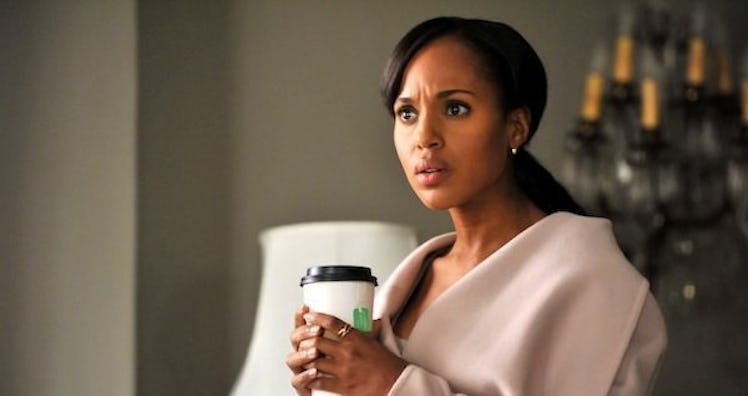
Kerry Washington Wants Media To Be More LGBT-Friendly And She's Right
"Scandal" star Kerry Washington wasn't just celebrating when she walked on stage to receive her Vanguard award at the annual GLAAD Media Awards.
She used her speech as an opportunity to demand the need for more LGBT representation in the media and the responsibility all minorities share in demanding such justice.
Washington said, as the crowd gave her a standing ovation,
We need more LGBT representation in the media. We need more diverse LGBT representation, and by that I mean lots of different kinds of LGBT people living all different kinds of lives.
As the audience roared with applause, Washington calls out all the minorities -- treated as "others" -- in society. Despite the progress mainstream media have made in representing LGBT characters, she reminds us we still have a long way to go.
The numbers don't lie.
In GLAAD's 2014 "Where We Are On TV" review, its team calculated just how well-represented the LGBT community really is on television, and the numbers weren't too promising.
The analysis of characters on scripted primetime broadcast television for the 2014-2015 schedule found 3.9 percent of series regulars portray LGBT roles. This statistic is down from 2012's record high of only 4.4 percent.
Washington so honestly shared with the audience,
We must be allies and we must be allies in this business because to be represented is to be humanized.
LGBT is an umbrella term commonly used to describe members of the lesbian, gay, bisexual and transgender community.
In today's media, this acronym might as well be "lGbt" since over 50 percent of the queer representation is made up of gay men. Bisexual and transgendered characters are still rarely found, if at all.
In terms of ethnic and racial diversity, the data are also skewed. Almost three-quarters of actors are Caucasian, which puts a lot of pressure on the handful of non-white LGBT characters out there to represent their communities well. That is, if you can even find them.
"We have been pitted against each other and made to feel like there are limited seats at the table for those of us who fall into the category of 'other.'
As a result, we have become afraid of one another," Washington said. "Sometimes, even within our own communities, we designate who amongst us is best to represent us and who shouldn't really be invited to the party."
Washington's sentiment is one that is not always acknowledged within the LGBT community.
In the pursuit of equal rights and representation, sometimes we unintentionally create "others" within our own community. This creates further marginalization, which only fosters more competition and divisiveness.
We want to see ourselves reflected on TV.
This is where media can play the role as our best friend or worst enemy. While media do not reflect reality, they certainly play a role in shaping how we interpret them.
The film and television industries share stories to increase awareness and importance of certain topics.
Before the 2000s, the film and television industries were cautious to portray gay characters because it meant taking a huge risk in the box office.
As the success of a movie or show is often measured by its box office ratings, it's no surprise producers shy away from putting the spotlight on an LGBT character.
Thankfully, with growing support the LGBT rights movement and recent marriage equality legislations, we're now starting to see a media culture that extends beyond heteronormative lifestyles.
Since LGBT isn't akin to skin color, one cannot easily identify another's sexual orientation based on appearance alone. To compensate, the media tend to give LGBT characters flamboyant personalities and outrageous behaviors.
For instance, popular shows like "Will & Grace" and "Sex and the City" depict gay men as being feminine and flashy.
While these examples did create media representation for gay men, it came at the cost of creating and reinforcing stereotypes that pigeonholed the entire community.
We must have breadth and depth in our media.
We must not only showcase all the types of "others" out there, but also the multifaceted lifestyles and personalities these "others" have.
Imagine a world in which LGBT characters aren't put in TV and film primarily as symbols of their sexuality. What will happen when a post-gay culture finally exists?
"I don't decide to play the characters I play as a political choice. Yet the characters I play often do become political statements," Washington said, adding, Having your story told is sadly often still a radical idea. There is so much power in storytelling and there is enormous power in inclusive storytelling. We need more employment of LGBT in front of and behind the camera.
No matter what our intention, anyone who is an "other" in the media is a political statement by nature. Even if they aren't in front of the camera, "others" are constantly shaping perceptions and defining what it means to be part of a minority community.
Washington urges "others" to continue pushing the envelope because ultimately it's storytelling that will set the standard for current and future generations.
Washington closed her speech by saying,
In the real world, being an 'other' is the norm. In the real world, the only norm is uniqueness and our media must reflect that.
And uniqueness is something to be proud of.